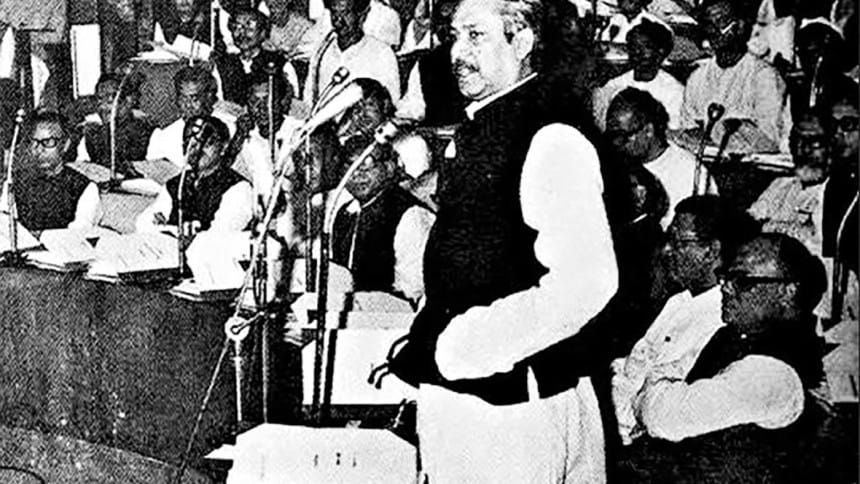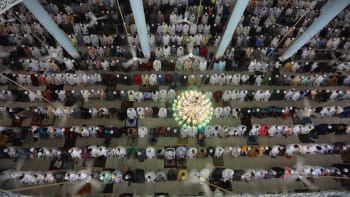‘Being Inclusive’ – An Ideal of Bangabandhu’s Politics

The courtyard of Gulshan's Holey Artisan Cafe is very familiar to me. Our only child was born in the Lakeview Clinic, located in this courtyard. It is surprising to believe that in 2016 twenty innocent lives both natives and foreigners, were killed in the same courtyard. Although in Bangladesh some brutal killings of this nature have occurred in the past, this is the first time it happened on such a large scale. Those who were involved in these brutal killings are a group of youths who are devoid of their history and culture, isolated from the common people, and believed in radical religious and militant values.
Over the past decades or so, we have been seeing such religious militancy and brutality globally. In addition, currently the world is witnessing a full-scale war and atrocities in Europe. In the light of today's global militancy and war, it may be pertinent to emphasize the ideal of Bangabandhu's political inclusiveness.
a) Have you seen the film 'Roots', produced based on a novel written by Alex Haley? It's a movie serial in many parts released in the late seventies. It is a saga of how a civilized society (in this case America) in the modern era turned free-willed Africans into slaves by force and in an inhumane way. The story begins like this –
In the mid-eighteenth century, a child was born to a Mandinka tribal warrior in West Africa, the name 'Kunta Kinte'. The father took the newborn child to the top of the hill and lifted him to the sky in his two palms and chanted - 'Allahu Akbar' ('God is most great') and asked for God's blessings.
The scene etched in my mind and remained etched in my memory for a long time.
Like Kunta Kinte's father, I could not take my newborn child to the top of the hill. However, standing on the veranda of the Lakeview Clinic, I took him in my palms and raised him on my head and chanted 'Allahu Akbar'. It is shocking to believe that in the same courtyard where I accepted my only child with Allahu Akbar, a group of young people who believe in extremist religious and militant values killed innocent people by also chanting 'Allahu Akbar'.
Where have our values gone?
A religion that is seen as liberal, humane, and progressive today is being perceived as narrow-minded, inhumane, and militant. Muslims who have been welcomed in nations for centuries after centuries, today are being banned or expelled from countries. These are not isolated incidents, happening widely. Today politicians and people in the West are indoctrinated with the idea that 'Muslims are a threat to their way of life'.
The radical religious militancy of a small minority is degrading us as Muslims, providing an opportunity to question our religion, and pushing the economies of the developing nations to the brink of destruction.
Bangabandhu realized long ago that people's liberation cannot come amid of religious politics. Although India was partitioned based on religion in 1947, he realized during the 'United Front' election in 1954 that Bengalis have deep faith in religion, however, not in politics of religion. People cannot be deceived by slogans in the name of Islam and Muslims. He emphasised that " 'Dharma Pran' Bengali Muslims love their religion, but they would not allow themselves to be made fools of by people who were interested in using Islam for political gains" (P. 263, The Unfinished Memoirs, Sheikh Mujibur Rahman).
In 1955 he proposed to change the name of the party from Awami 'Muslim' to Awami League. This was not just an exclusion of a word but had a far-reaching implication. It was meant to welcome people from walks of the society irrespective of their caste, creed, and colour to participate and contribute to nation-building activities. In other words, to make all feel 'Being Inclusive'.
The appeal of feeling 'inclusive' was both in the 'physical' and 'psychological' sense. In terms of its impact, the 'psychological' appeal predominated over the 'physical' appeal. As a result, despite not being around Bangabandhu from the 'physical' sense, millions of Bengalis were by Bangabandhu's side from the 'psychological' sense. The result of the 1970 election is a testimony of that. When an entire nation, irrespective of religion and colour stands on one platform with the spirit of one mantra, many impossible can be made possible. The evidence of which is our war of independence.
Bangabandhu's politics of secularism was born out of the belief in 'being inclusive'. After the independence, this ideal was included as one of the four pillars of the constitution of Bangladesh. Unfortunately, the assassination of Bangabandhu on August 15, 1975, re-established religious politics in Bangladesh. As a consequence, today, people of different religions and castes may live side by side from the 'physical' sense, however, from the 'psychological' sense they are far apart. An issue that was resolved in the 1970s, its legacy still lingers to date. Is there any alternative other than Bangabandhu's ideal of 'being inclusive' in both 'physical' and 'psychological' sense in Bangladesh's efforts to social and economic prosperity?
b) Kunta Kinte gradually grew up freely in the wild African environment. By the time he reached his adulthood, one day he was attacked, captured, imprisoned by slave traders, and sent to the Americas. In other words, a free and independent Kunta Kinte was forcibly made a slave Muhajir (emigrant). This is in the 'physical' sense. Even his rebellious spirit could not stop this transformation.
But transformation into a Muhajir is not limited in the 'physical' sense only. The next blow comes with his name. Kunta Kinte's master changed his name to 'Toby'. He frantically resisted the new naming by putting his life at stake. Even then couldn't stop the change. Then they took away Kunta Kinte's language, the mother tongue of the Mandinka warriors. In other words, the so-called civilized society took away 'Kunta Kinte's West African way of life'. Thus, by taking away his name and language; depriving him of his culture and ancestral history, they transformed Kinta Kinte into a slave muhajir in the 'psychological' sense. Isn't it easy to exploit those who have no history, no culture?
At the outset of the nation's creation, the Pakistani administration sought to 'psychologically' transform the people of East Bengal by depriving them of their alphabet, language, culture, and history. In 1952, along with other politicians, Bangabandhu protested to protect the mother tongue. His role does not end here. He realized that history and culture are inextricably linked with the naming of the motherland. Bangabandhu was then a member of the Constituent Assembly of Pakistan. On August 25, 1955, in his inaugural address to the Constituent Assembly of Pakistan in Karachi, he addressed the speaker: "Sir, you will see that they (members of the Constituent Assembly of West Pakistan and Muslim League) want to use the phrase 'East Pakistan' instead of 'East Bengal'... We demanded many times that you should use 'Bengal' instead of 'Pakistan'. The word 'Bengal' has a history and tradition of its own...". Needless to say, the name of any province in West Pakistan has never been changed.
It's worth mentioning here that almost sixty years after Bangabandhu's speech in the Parliament of Pakistan, a prominent Pakistani columnist wrote: "…. the renaming of 'East Bengal' as 'East Pakistan' was the most divisive event in the political history of Pakistan and the critical first milestone towards the division of Pakistan (Syed Anwar Mahmud, 17 December 2012, Remembering the breakup of Pakistan, The News International).
It was impractical for the Pakistani rulers to expel Bengalis from their homeland and make them muhajir in a 'physical' sense. Nonetheless, they tried to take away their language, culture, and history and make them muhajir 'psychologically'.
He who has no history has no past. He who has no past has no ancestor. There are no tales or fables of his forefathers, be it tales of defeat or heroism. A nation that is hollow in arts and culture remains eternally incapable of being creative and innovative. These issues were well understood by the then Pakistani rulers. So, the blow came to erase history and culture of East Bengal.
The so-called civilized society deprived Kunta Kinte of his nationhood and history. By taking away religion, name, and language, in the name of 'being inclusive', they made him a 'slave muhajir' in both 'physical' and 'psychological' sense. By depriving Bengalis of their language, and culture, and renaming the motherland, in the name of 'being inclusive', the Pakistani rulers attempted to make the Bengalis muhajir in the 'psychological' sense. In both cases, the objective was the same, and that is exploitation. In the first case, it is the exploitation of 'slave muhajir', and in the second case, it is the 'market' exploitation. Today, worldwide religious militancy and warmongers are trying to be 'Being Inclusive' by taking away people's lives, livelihood, and beliefs.
It is not possible to create an environment of 'inclusiveness' by taking away from people or depriving them. If life is taken away, for who the 'inclusiveness?
Bangabandhu conceived the concept of 'inclusiveness' in loving people, whose strengths and weaknesses were both around people. Bangabandhu once said – "My greatest strength is the love for my people, my greatest weakness is that I love them too much" (Sheikh Mujibur Rahman, Source: Interview with Sir David Frost on the BBC, 1972). Only through loving people, irrespective of their caste, creed, and colour, one can create an atmosphere of lasting 'inclusiveness'.
The writer is a Professor at the Department of Supply Chain and Logistics in RMIT University, Melbourne, Australia.

 For all latest news, follow The Daily Star's Google News channel.
For all latest news, follow The Daily Star's Google News channel. 



Comments